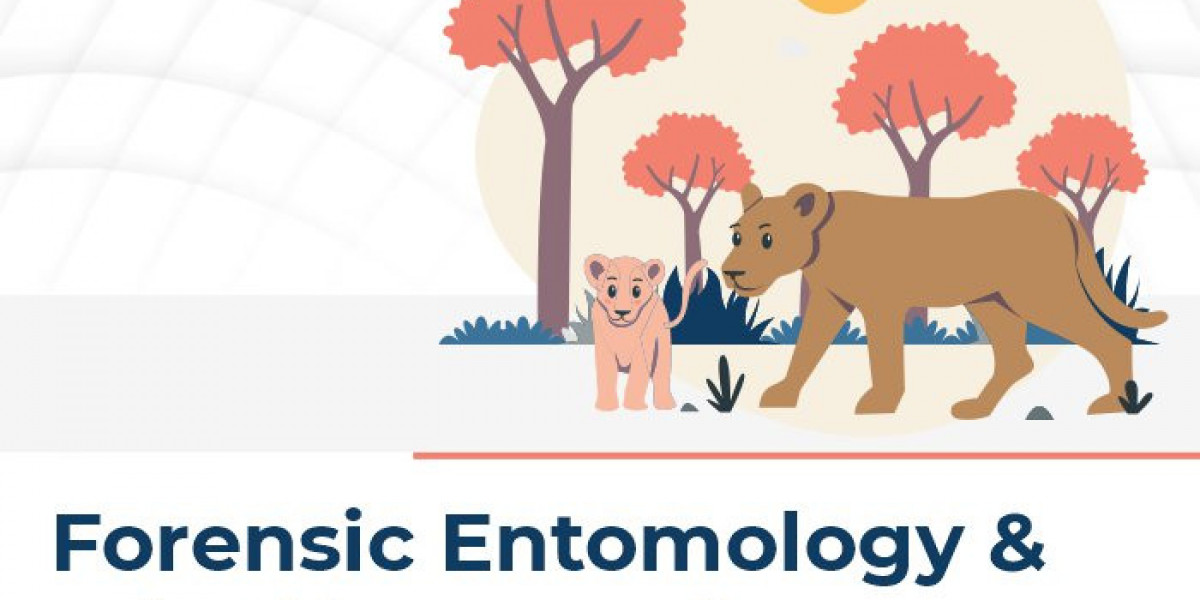Wildlife and forensic entomology are two sub disciplines of forensic science that address wildlife criminal cases and the use of insects in determining the cause of death. This online course combines biology, ecology, and forensic science to solve site-specific cases and keep the environment safe.
Basics of Wildlife Forensic Science
Wildlife forensics can be defined as the study of offences against wildlife such as hunting, trading and destruction of natural resources. Key components include:
Species Identification: Genetic and morphological analysis to work out the sample origin.
Tracking Illegal Trade: Outlawed things such as ivory, animal skin/ furs, or endangered species.
Crime Scene Investigation: Gathering information from poaching or trafficking scenes.
What is Forensic Entomology?
Forensic entomology is the use of insects in solving crime This discipline focuses on information from insects. The primary applications include:
Postmortem Interval (PMI) Estimation: Post mortem insect colonization as the basis of assessing time of death.
Insect Succession: Studying the sequence and the insects life cycle on corpses.
Wildlife Cases: Studying insect infestations to understand poaching or carcass relocation.
Course Modules
1. Wildlife Forensics – Basic Knowledge
- Introduction to the importance of wildlife protection.
- Methods for the sampling of the species through DNA, fur or feather.
- Tools for tracking the origin and movement of wildlife contraband.
2. The Elements of Forensic Entomology
- Main facts about insects and their activity.
- The process of obtaining and conserving insects.
- How to connect insect evidence to death investigation and wildlife crime.
3. Forensic Investigation Involving Wildlife Crimes
- Measures which need to be followed in cases of reporting poaching or trafficking.
- Gathering and recording of such evidence.
- Working with conservationists and policemen.
4. Legal Aspects and Ethical Concern
- Laws against hunted animals and species that are on the brink of extinction.
- Best practice in forensic ethics.
- Use of wildlife forensic in the court.
5. Practical Applications and Case Studies
- Real-life cases involving wildlife crime and insect evidence.
- Training that demonstrates formulation of forensic samples.
- Issues with wildlife forensic science.
Skills You Will Gain
This course equips learners with:
Species Identification Expertise: By employing high tech methods such as DNA barcoding.
Insect Evidence Analysis: Insect behaviour and its uses in forensic.
Field and Laboratory Skills: Key considerations of success in collecting and preserving evidence.
Legal Knowledge: Understanding regulations around wildlife protection and evidence presentation.
Who Should Enroll?
The course is ideal for:
Conservationists: Safeguard bio diverse environments and ensure the due implementation of wildlife legislation.
Forensic Experts: Solicit growth in specialized niche areas of the practice of forensic science.
Law Enforcement Officers: Work on cases of crime against wildlife and poaching.
Students and Enthusiasts: Enhance your understanding of a special and significant area of forensic investigation.
Applications of Wildlife Forensic and Forensic Entomology
1. Combating Wildlife Crime
- Source recognition of illicit wildlife articles.
- Monitoring of the flow of products based on endangered species.
2. Death Investigations
- Determining time and circumstances of death using insect evidence.
- Relation of carcass depositing points with crime scenes.
3. Environmental Protection
- Examining factors such as habitat loss, and logging.
- Accompanying ecological restoration initiatives with forensic data.
Problems Encountered in Wildlife and Entomological Research
Ecosystem Complexity: Addressing the ecological factors influencing evidence.
Preservation of Evidence: In this case, one must make sure that the means to be used does not get contaminated.
Limited Resources: Meeting the needs concerning shortage of specialist training and equipment.
You will find ways and means to address these challenges within this course through new approaches, and scenarios.
Emerging Trends in Wildlife Forensics and Entomology
Genomics in Wildlife Identification: Rapid identification of species using DNA barcodes due to the improved DNA Sequencing.
AI in Insect Analysis: Surveying the possibilities of recognizing the spider’s species and the stages of insects’ development.
Remote Sensing in Habitat Monitoring: Environmental monitoring with aerial and satellite platforms to patrol for illegality.
Interdisciplinary Collaboration: Application of forensic science in conservation genetics.
This keeps the learners in touch with these advancement to enable them cope with today’s challenges in these fields.
Why Choose an Online Course?
Comprehensive Content: It further encompasses theory, tools and their real life applications.
Flexibility: Study as you wish and when you wish.
Expert Guidance: Insights from professionals in wildlife forensics and entomology.
Real-World Relevance: Focus on actionable skills and case-based learning.
Conclusion
Wildlife investigation and forensic insect courses offer critical knowledge areas of science, technology and justice. In this course, you will be equipped with the knowledge required in environmental conservation, wildlife crimes and sustainable conservation.
Whether one is interested in becoming an expert in a field, or a hobbyist who wants to set up a new initiative, this course can help. It is high time to see the wonders of wildlife identification, investigation, and even the entomological science with activity today!










